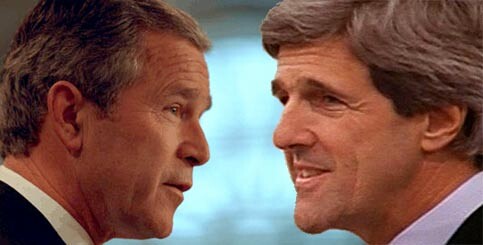The Electronic Intifada 6 April 2004

Lately, Senator John Kerry has been reassuring voters that he will be as pro-Israel as President Bush. He has expressed his support for Sharon’s policy of unilateral disengagement, building of the so-called security barrier and the political isolation of Yasser Arafat. The candidate’s present position toward Middle East peace contradicts his past support of the Oslo peace process and provides a surprising contrast to his views when he was a young anti-war leader in the early ’70s.
In April 1971 young John Kerry, a war hero, who was a member of Vietnam Veterans Against the War went to Washington to protest the American military presence in Southeast Asia. In what is considered the beginning of Kerry’s public career, the handsome decorated officer testified before the the Senate Foreign Relations Committee and was interviewed extensively in the national media. The young Kerry shocked the nation when he related that war crimes and atrocities were being routinely committed by American soldiers in an unjust war. Like the Americans in Vietnam, now Israeli soldiers are being sent by their government to battle against an indigenous population that is attempting to rid themselves of a foreign invasion force.
The organization, Courage to Refuse, whose members are Israeli army reservists that refuse to participate in their country’s war of occupation are reminiscent of the members of Vietnam Veterans Against the War. Like John Kerry in the early 70s, these reserve soldiers are telling the Israeli public about the war crimes, atrocities and violations of the Geneva Conventions that the Israeli army is committing routinely in the West Bank and Gaza. The Israeli refusers are saying that Sharon’s war in the territories is not a just war of defense, but a unjust war of occupation and oppression. They are saying, as John Kerry said to US Senators in 1971, that what the soldiers are doing is not accomplishing any lofty goals, but are destroying the moral fabric of their own society.
More than 30 years later, Senator John Kerry has been defining himself as a Presidential candidate who would, if elected, continue the Bush foreign policy in regard to the Israeli-Palestinian conflict. If you listen to what he is currently saying, you get a feeling that he wants voters (especially Jewish voters) to believe that a Kerry presidency would be even more supportive of the Sharon government, and actually less even-handed in its dealings with the Palestinians than the current administration. This is his present position despite some previous statements Kerry made fairly recently which indicate that he may have supported a more open-minded US policy toward the region.
Abraham Foxman, the Anti-Defamation League’s national director, who was present at a recent meeting in New York City between Kerry and 40 Jewish leaders, reported that Kerry laid “to rest a nagging concern - that relentless Democratic criticism of Bush’s foreign policy implied criticism of Bush’s closeness to Israel.” This is according to Ron Kampeas in a column published in The Jewish Journal of Greater Los Angeles. The article further quotes Foxman as saying that Kerry “tried to exempt Israel from the [Democrat’s] critique of Bush’s foreign policy.” According to Kampeas, Foxman characterized Kerry as “agree[ing] with administration policy on isolating Palestinian Authority President Yasser Arafat, [and] supporting Prime Minister Ariel Sharon’s plan for unilateral withdrawal from Gaza and on the security fence.”
In a March 8 interview with the Associated Press, Kerry stated that Yasser Arafat was an “outlaw” who “has been an impediment to the peace process.” Further, Kerry opines that Arafat “blew his opportunity” to be effective in 1999 and 2000. In stating that Arafat missed his opportunity in 2000, the Massachusetts Senator is alluding to the pro-Israeli position that then Prime Minister Ehud Barak made the Palestinians the most generous possible offer at Camp David, a wonderful deal which Arafat irrationally refused without making any counteroffer. Thus this proves, according to the above version of events, that there is no Palestinian peace partner with which the Israeli side can speak. This is simply not true, although it has been repeated so often in the American press that I imagine it forms the basis of most Americans’ opinions about Yasser Arafat and of the Oslo peace talks.
Actually, after the failure of the July 2000 Camp David Summit, the negotiations continued through January 2001 when they were suspended by the Israeli Prime Minister Barak, not anyone on the Palestinian side. (For a good account of the failure of the Camp David Summit and its aftermath see Deborah Sontag, “The Quest for Peace in the Middle East: How and Why It Failed,” New York Times, July 26, 2001.) The curtain fell on the final act of the Oslo peace process at Taba, Egypt where the Israeli representatives agreed to significantly better terms for the Palestinians than they had offered at Camp David. The expressed feeling of the principal Taba negotiators was they were close to achieving a workable final agreement and could have succeeded if given more time. Unfortunately, time had run out for the peace process when Ariel Sharon, a long-time opponent of the Oslo negotiations became Prime Minister.
Although the current Israeli government has repudiated the Oslo peace process, many political leaders in Israel and throughout the world who are seeking a just and workable solution to the Israeli Palestinian conflict, feel that the negotiations at Taba will form the basis for any future peace settlement. Among this group are former US Presidents Clinton and Carter and British Prime Minister Tony Blair. Until lately this group included the Democratic candidate for President of the United States. As recently as December 3, 2003 Kerry told the Council on Foreign Relations in New York that “it’s astonishing to me that we are not picking up somewhere near where we left off at Taba…”
Unfortunately, Kerry seems to have now decided that it is not in his political interest to be expressing views which are not in accord with those of President Bush, the neo-conservatives in his administration, or establishment Jewish American leaders. New York House Speaker Sheldon Silver, a Kerry supporter, has recently put out the word that Kerry was distancing himself from any remarks he made at the Council on Foreign Relations. John Kerry the Presidential candidate, who is actively seeking the Jewish vote, will not be supporting any negotiations starting from where the Taba negotiations left off.
The decision not to mention Taba is extremely disappointing to people who had hoped the Democratic candidate would propose a new direction for American foreign policy toward promoting peace in Israel/Palestine, one which challenges the Sharon government and Bush neo-conservative visions. The Geneva Accord which is an unofficial model treaty sponsored by Israeli and Palestinian current and past officials, is a continuation of the Oslo process and the Taba negotiations. In fact, its leading proponents were negotiators at Taba.
The Accord, which was unveiled at a public ceremony in December 2003, has strong support worldwide and is considered by many the best possible workable solution to achieving a permanent agreement. Its supporters include former Presidents Carter and Clinton, along with many European statesmen. Egypt and Jordan are contemplating using the Geneva Accord as a basis for a new Arab League peace initiative. However, it should be noted that the Accord saw widespread opposition among Palestinians because it is based on the flawed Camp David ideas and does nothing to guarantee refugee rights.
Unfortunately, the John Kerry Middle East policy statement on his web site makes no mention of Taba or the Geneva Accord, but does mention Kerry’s support for the Bush “roadmap” which is now widely considered inoperative. One of the mantras that the Democratic candidates recited when asked about what they would do in regard to the Israeli-Palestinian conflict, was that unlike President Bush they claimed that they would be deeply engaged in the issue. This is pretty much an answer which avoids the minefield that addressing Israel and Palestine can be for a US Presidential candidate. Kerry, like his vanquished rivals, speaks frequently of increased engagement, but also adds, as he did at the Council on Foreign Relations that if he were President, he would appoint a special envoy to the region such as former Presidents Carter or Clinton, or past Secretary of State James Baker.
Both Carter and Clinton are supporters of the Geneva Accord. Ariel Sharon is vehemently opposed and has called the Israeli initiators of the Geneva Accord traitors. James Baker is anathema to many Jewish leaders since he is remembered for pressuring the right-wing Israeli Prime Minister Yitzhak Shamir to the peace table at Madrid and suspending loan guarantees to Israel as a result of Shamir’s policy of settlement expansion.
Some time after Senator Kerry’s introduction to the New York Jewish community leaders, he decided that his choices for envoy were inappropriate. Instead of Clinton, Carter or Baker, he now lists Sandy Berger, Clinton’s national security advisor, and Dennis Ross, the chief Middle East envoy under the first President Bush, as the type of person he would send to the Middle East. Both these men are considered much more acceptable to the Israel lobby. Dennis Ross is presently the Director of the Washington Institute for Near East Studies, which is a think tank with a definite pro-Likud, pro-Sharon bias and with numerous ties to the Bush administration’s Middle East team.
Last year Kerry told an Arab-American audience that the so-called security barrier that Israel was building was “an obstacle to peace.” Now he claims he has no problem with the barrier, since its route has been altered. It seems Mr. Kerry’s position has been altered to a much greater extent than the route of the barrier. The wall is still situated totally in occupied territory causing great hardship and in clear violation of international law. Also, it is still to be decided if the barrier will be built as recommended by the Israeli Army, to encircle most of the Palestinian population, thus creating virtual prisons for the Palestinian people.
In summer 2003, Mr. Kerry published an article in a Brown University publication titled, “A Powerful Journey, An Essential Dream,” where he wrote, “[i]n this difficult time we must again reaffirm we are enlisted for the duration - and reaffirm our belief that the cause of Israel must be the cause of America - and the cause of people of conscience everywhere [emphasis mine].” If these are the words of an honest broker, I would rather have the Bush team working for peace in the region. At least they occasionally pay lip service to the Palestinian position. Kerry ends his article with a slogan associated with the religious pro-settler bloc, “am yisrael chai” or long live the people of Israel. The article was written for a book published by a campus Jewish student organization and it was probably composed by a Kerry aide. Still it makes me a bit uneasy when I imagine that someone with these views may be writing President Kerry’s speeches in the not too distant future.
A look at Kerry’s position on Israel-Palestine as stated on his web site is instructive. As was stated previously, there is no mention of the Geneva Accords, Taba or the Oslo peace process. He does, however, say that he accepts the Bush roadmap as “an acceptable approach for reinvigorating the peace process.” There is no mention of the removing settlements or freezing settlement expansion. Kerry suggests only the vague prescription that “the Israeli government must be prepared to respond with steps to alleviate hardships on the Palestinian people,” if the Palestinian authority effectively fights terror against Israeli citizens. There is no mention of the security barrier as a “barrier to peace.” This is not a statement which is encouraging to anyone other than those who support the present Bush-Sharon policies.
In his twenty-year career in the Senate, Kerry has been a strong supporter of the Israeli government. (For a detailed account of his positions, see Stephen Zunes, article in CommonDreams.org, March 5, 2004, “Kerry’s Foreign Policy Record Suggests Few Differences with Bush.”) Yet, the Massachusetts Senator’s support of the Oslo Process during the Clinton administration, the changing political realities in the Middle East, his recent statements about Taba and the security barrier, and the need to work with and listen to the opinions of our allies, led some people to hope for a more enlightened and even-handed policy toward Israel and Palestine. In addition, those of Kerry’s generation may remember his moral outrage and his protest against the Vietnam War.
Despite any indications to the contrary, I fear that those who thought Kerry may have contributed to the peace process in Israel/Palestine will be disappointed to learn of Senator’s current public stance. Barring a sudden change of heart and a burst of courage, we must sadly assume that a President Kerry will be at least as pro-Sharon as President Bush. I think that it would have been much more difficult for the young soldier who spoke so eloquently at the US Capitol in 1971 to ignore the many parallels between the failed US policy in Vietnam and Israel’s war against the Palestinians than it apparently is for a Senator who wants to be President.
Ira Glunts first visited the Middle East in 1972, where he taught English and physical education in a small rural community in Israel. He was a volunteer in the Israeli Defense Forces in 1992. Mr. Glunts lives in Madison, New York where he operates a used and rare book business.




